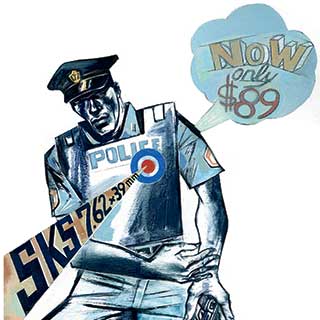Omar Samaha’s sister Reema was among those gunned down at Virginia Tech in April 2007 when Seng-Hui Cho rampaged through classrooms with two semi-automatic pistols. In the shootings’ aftermath, many were shocked to learn that Cho, with a long history of psychiatric problems, was able to obtain his weapons legally. Although Cho purchased his guns from licensed dealers, the Virginia Tech killings brought new scrutiny to Virginia’s gun-show loophole: unlike larger, licensed dealers that sell in large quantities, small, unlicensed dealers are free to sell weapons at gun shows without completing background checks. And whereas many small dealers will do background checks anyway, many don’t, creating an obvious opporunity for buyers who might not otherwise qualify to own weapons.
Omar Samaha recently drove this home when, accompanied by a film crew from ABC News, he purchased ten firearms at a Virginia gun show in under an hour without undergoing any background checks. Last year, in a similar exercise, I attempted to purchase an assault rifle at gun show in Fishersville, Virginia, but was unable to do so based on my DC residency. But had I lied about my residency or produced a fake license, I might just as easily have walked out with one.
With a new administration in Washington, some Senate Democrats are making a new push to close the gun show loophole. Joined by Omar Samaha, several others affected by the Virginia Tech shootings, and the Brady Campaign’s Paul Helmke, New Jersey’s Frank Lautenberg, Rhode Island’s Jack Reed, and California’s Diane Feinstein announced Tuesday that they plan to introduce legislation to make background checks mandatory for every gun purchase, whether from licensed dealers or not.
From a press release announcing the move:
The bill would help keep guns out of the hands of criminals, terrorists, the mentally ill and gun traffickers by requiring background checks on all sales at gun shows. In 1993, the Brady Law was passed requiring prospective purchasers of guns sold by federal firearms licensees, like gun shops and pawn shops, to go through a background check. However, a loophole in current law allows people to purchase guns from unlicensed sellers at “gun shows” without going through any background check.
In 1999, Sen. Lautenberg introduced the first bill in Congress to close the gun show loophole. Later that year, in the wake of the Columbine tragedy, the Senate passed Sen. Lautenberg’s legislation to close the gun show loophole as an amendment to a juvenile justice bill. The legislation passed by one vote, with Vice Al President Gore casting the tiebreaking vote. However, the gun lobby killed the legislation in House-Senate conference.






